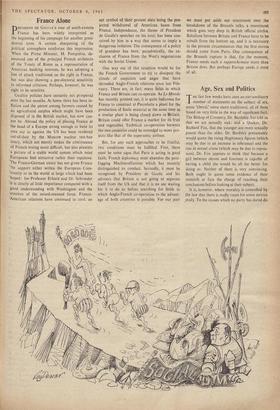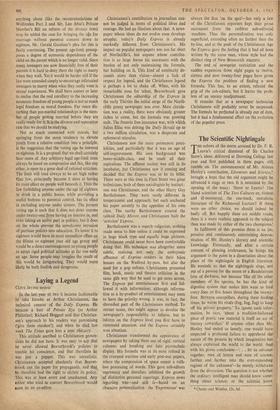Age, Sex and Politics
THE last few weeks have seen an extraordinary number of statements on the subject of sex, some 'liberal,' some more traditional, all of them based on very little in the way of significant fact. The Bishop of Coventry, Dr. Bardsley, has told us that we are sexually sick; and a Quaker, Dr. Richard Fox, that the younger are more sexually potent than the older. Dr. Bardsley presumably would quote the rising illegitimacy figures (which may be due to an increase in tolerance) and the rise in sexual crime (which may be due to repres- sion). Dr. Fox appears to think that because a girl between eleven and fourteen is capable of having a child she would be all the better for doing so. Neither of them is very convincing. Both ought to quote some evidence of their research or face the charge of reaching their conclusions before looking at their subject.
It is, however, where morality is controlled by the law that there is really room for some serious ,study. To the causes which no party has dared do anything about (like the •recommendations of Wolfenden Part 2 and Mr. Leo Abse's Private Member's Bill on reform of the divorce laws) may be added the case for bringing the aAe for marriage without parental consent down to eighteen. Mr. Gerald Gardiner's plea for this is fairly convincing. The present age-limit presup- poses a degree of economic dependence of the child on the parent which is no longer valid. Since many teenagers are now financially free of their parents it is hard to deny them the right to marry when they wish. Yet it would be harder still if the law were amended simply to encourage infatuated teenagers to marry when what they really want is sexual experiment. We shall have sooner or later to realise that the real corollary to the increasing economic freedom of young people is not so much legal freedom as moral freedom. Far more dis- turbing than pre-marital relationships is the num- ber of people getting married before they are really ready for it. It is the divorce and separation rate that we should be studying.
Not so much connected with morals, but springing from the same tendency to elevate youth from a relative condition into a principle, is the suggestion that the voting age be lowered to eighteen. It is a proposal that we shall certainly hear more of. Any arbitrary legal age-limit must always be based on compromise and this, like any other, is open to a great deal of rational criticism. The limit will tend always to be set high rather than low, principally because it aims at having its main effect on people well beneath it. Thus the law forbidding anyone under the age of eighteen to drink in a public house, while providing a useful buttress to parental control, has its effect in excluding anyone under sixteen. The present voting age is such that it does not deter anyone under twenty-one from having an interest in, and even taking an active part in politics, but it does on the whole prevent the unwelcome intrusion of partisan politics into education. To lower it to eighteen would have its most immediate effect on the fifteen to eighteen year old age group and would be a direct encouragement to young people to adopt rigid political attitudes at far too early an age; Some people may imagine the result of this would be invigorating. They would more likely be both foolish and dangerous.











































 Previous page
Previous page